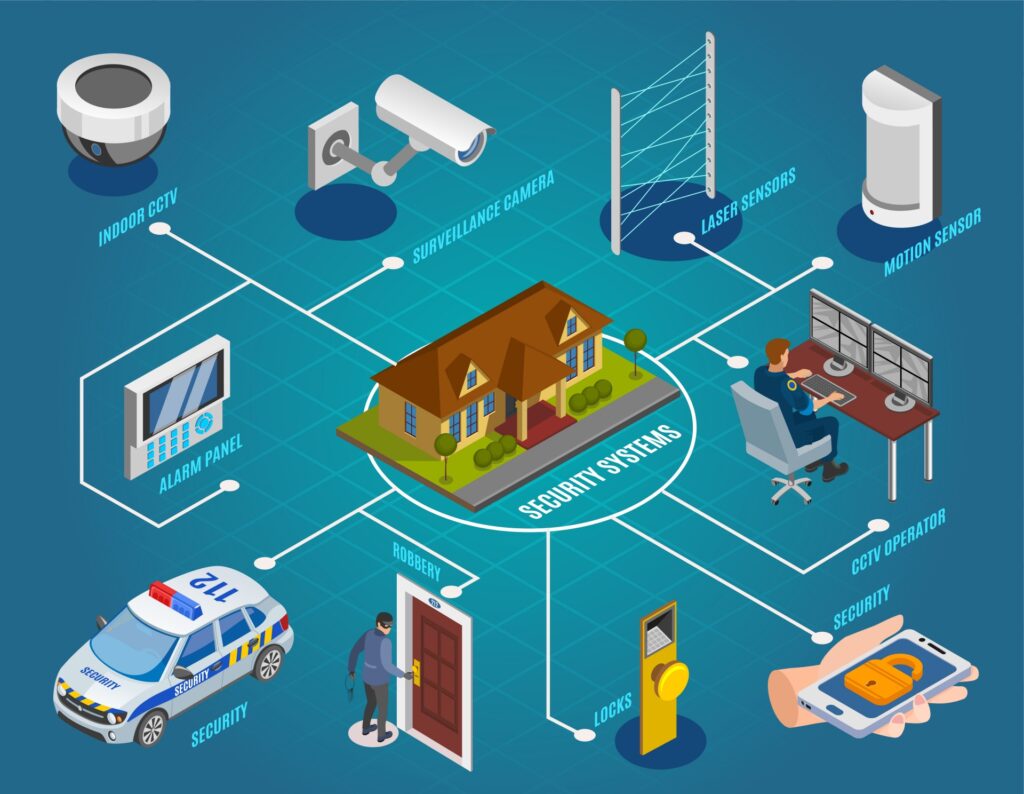- What is a home alarm?
- How does a home alarm work?
- Advantages and fields of application
- Deterrence
- Protection
- Security
- Customization
- Price
- What types of house alarms are there?
- The wired home alarm
- Wireless home alarm
- The connected home alarm
- The fire alarm

What is a home alarm?
What exactly is a home alarm? To be clear, it is better to first describe what we mean by a home alarm. A home alarm is a device that can be used to fight against risks that can threaten a home such as intrusion or fire.
It usually consists of a siren and a control unit as well as several detectors sensitive to movement, smoke, heat or shock. The home alarm is used to identify a danger that threatens property or people living in the dwelling to warn owners or law enforcement officials who are able to secure the situation.
In most cases, the home alarm device is used to transmit information to the person most competent to intervene but does not intervene directly to remedy the situation.
How does a home alarm work?
How exactly does a home alarm work? We first have to look at the overall operation of a home alarm. It turns out that the principle of most commercially sold home alarms is similar. The occupant of the dwelling must activate the alarm. Activation can be done manually, automatically or remotely. This manipulation allows activating the sensors that will then detect and signal any danger.
When an intrusion, shock, fire or other problem that can be detected by the home alarm is detected, the home alarm triggers an audible siren. It transmits the information to the owner of the premises or a monitoring centre. The intervention or evacuation of the dwelling will then be organized to ensure the safety of property and people present in the house. All alarms listed in here have a similar operation.
Advantages and fields of application
What are the most significant advantages of a home alarm? The use of a home alarm in a home has several advantages. We listed them:
Deterrence: Installing a home alarm is the best way to deter burglars from breaking into your home. Our research has shown that a house that is not equipped with a security system is four times more likely to be burglarized than a home with a home alarm. Stickers visibly affixed to show that the house has an alarm system that will deter many burglars from taking action.
Protection: In 95% of cases, the sound of a siren keeps the criminals away. Thus, a home alarm provides excellent protection to your entire family as well as valuable property you own.
Security: The level of protection for home alarms has never been higher. Today, the slightest risk can be prevented or detected instantly.
Customization: Home alarms provide security adapted to the types of risks in your neighbourhood for better protection.
Price: A real decline in the price of home alarms has been observed over the last few years.
What types of house alarms are there?
To present you the best report for choosing the right home alarm, we have made a point of studying the various types of alarm available on the market. Our research showed us that several kinds of home alarms exist and that each one has its advantages and disadvantages.
The wired home alarm
This is the essential type of home alarm. It consists of a network of cables that allows communication to be established between the control panel and the various detectors. According to expert and consumer opinions, the main advantages of the wired home alarm are its reactivity and its high reliability. It cannot be hacked and is easily controlled using the control panel.
However, its disadvantages are that it is a costly model to set up, which involves heavy work to pass all the necessary cables. Another problem is that this is a type of home alarm sensitive to power outages.
Wireless home alarm
This type of alarm can use the local computer network, Wi-Fi waves, radio waves or take advantage of a GSM mobile network. It includes various sensors, detectors and control consoles, all capable of communicating with each other over a wireless network.
The advantages of this system are its speed of installation and lower cost. Indeed, it is elementary to set up different sensors and to connect them. This installation can be carried out by yourself and therefore dispenses with the intervention of a professional.
However, most of the opinions collected from professionals and customers point to the lower level of security of these wireless home alarms. The waves are more sensitive to interference, and the best-equipped burglars can hack some of them. GSM alarms are then the most reliable to resist these hacking attempts.
The connected home alarm
Our research reveals that more and more home alarms are part of a home automation system integrated into the home. These connected alarms can be controlled from a smartphone, tablet or computer. The main advantages of this type of alarm are better readability of the product, an essential variety of possible interventions for the user and high ease of installation.
Indeed, connected home alarms are more legible because they record the movements of the different users in the house. Inputs and outputs can thus be easily controlled. Also, many remote interventions are possible on this type of alarm. It can be activated or deactivated from a smartphone, and all these settings can be easily changed.
However, several opinions reveal the disadvantages of this type of alarm. These home alarms are less secure and cost more. Also, a system failure often results in many operational problems throughout the home automation system.
The fire alarm
The fire alarm is the only type of alarm that is mandatory in all homes. It consists of a sensor box capable of detecting smoke and emitting an audible signal to warn the occupants of the dwelling of the danger that threatens them. This type of alarm has several advantages: a low price, effortless installation by simple wall mounting and very high reliability.
However, it is also an alarm that has its disadvantages. Many unintentional triggers can occur when cooking, due to the fumes emitted during cooking. Its other weak point is the short life of the batteries that power it.
If you wish to buy alarms or any security device from Turkey, please do not hesitate to contact us by mail at [email protected] or to call us at +90 532 361 5149. We can help you to get in direct contact with producers or provide you with everything that you need.











